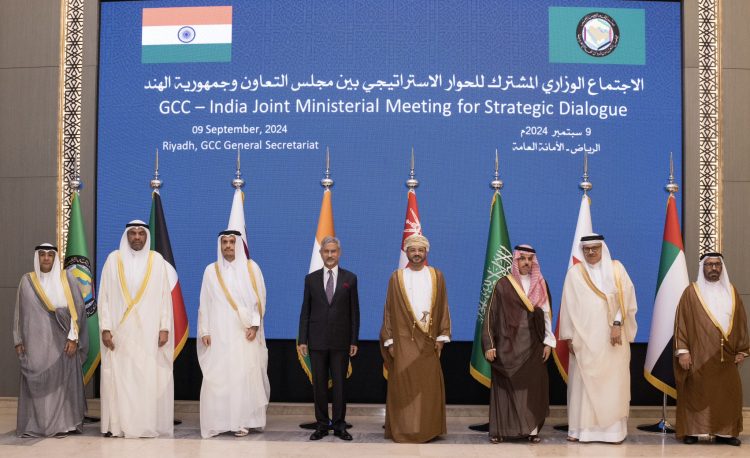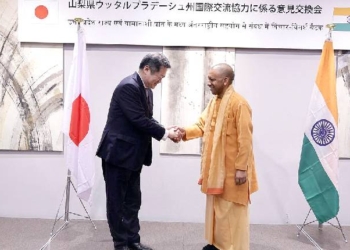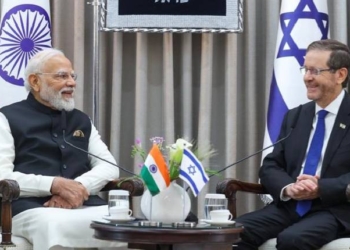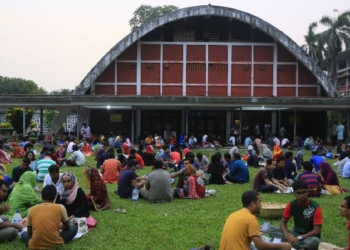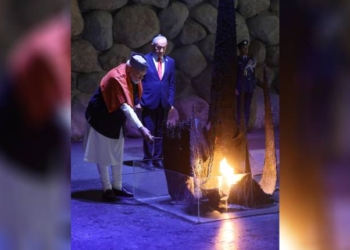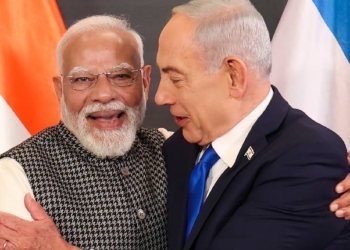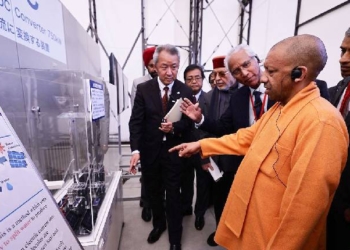Riyadh: External Affairs Minister, S. Jaishankar on Monday reiterated India’s “principled and consistent” stand on the Palestinian issue while calling for a ceasefire in the region, as soon as possible.
“The current situation in Gaza is now understandably our foremost concern. India’s position in this regard has been principled and consistent. While we condemn acts of terrorism and hostage taking, we are deeply pained by the continuing death of innocent civilians. Any response must take into account the principles of humanitarian law. We support a ceasefire as soon as possible,” the EAM said while co-chairing the inaugural India–Gulf Cooperation Council (GCC) Joint Ministerial Meeting for Strategic Dialogue in Riyadh.
“On the larger issue, we have consistently stood for a resolution of the Palestinian issue through a two-State solution. We have also contributed to the building of Palestinian institutions and capacities. Where the humanitarian situation is concerned, we have provided relief and increased our support to UNRWA,” he added.
The meeting took place at the headquarters of the GCC General Secretariat and on the sidelines of the 161st Ministerial Council meeting chaired by Qatar’s Prime Minister and Foreign Minister Mohammed bin Abdulrahman bin Jassim Al Thani, President of the current session of the Ministerial Council.
In his opening remarks, Jaishankar offered the framework of 3Ps – people, prosperity and progress – as the driving force behind the partnership.
“Our people-to-people ties are the bedrock of our relationship. Close to 9 million Indians work and live amongst you, acting as a living bridge between us. Their contributions to your economic progress are widely recognized. We thank you for ensuring their welfare and comfort,” he said.
Spotlighting that India is one of the world’s largest and fastest-growing markets – where much of the future demand is going to come from – the External Affairs Minister called on the Gulf Cooperation Council (GCC) to invest in each other’s future and support each other’s continued prosperity.
“Our interactions are key to driving prosperity – for the GCC and for India. Trade has not only expanded in volume but also in diversity, encompassing a wide range of goods and services that fuel our economies and create jobs. It is important that we think not just for today. The task before us is to invest in each other’s future and support each other’s continued prosperity,”
Calling the GCC a “cornerstone of global energy supply”, the External Affairs Minister called for deeper collaboration to stabilize markets, drive innovation and enhance energy security.
“Our partnership in the areas of renewables, technology and innovation, health, space, education can also help realize our respective national goals,” he said.
He mentioned that the India-GCC relationship goes beyond just transactions and is built on a foundation of trust, mutual respect, and a shared vision for the future.
“It has a larger goal of advancing progress in a world that is characterized by technological advancements, changing geopolitics, shifts in the global economy and the urgent need to address environmental sustainability. Progress and prosperity require its concomitant – security – to also be stronger. The Gulf region occupies a central place in contemporary geopolitics. In a world polarized by conflict and tension, we share a commitment to global peace, security, and stability,” he said.
Earlier, the EAM held a series of bilateral meetings with the Foreign Ministers from GCC member countries, beginning Monday by holding talks with Jassim Al Thani.
“Discussed taking India-Qatar bilateral ties forward. Appreciated his insights and assessments on regional developments,” Jaishankar posted on X after a “good meeting” with the Qatari leader.
EAM Jaishankar’s next meeting on Monday was with Faisal bin Farhan, Foreign Minister of Saudi Arabia which was also attended by the country’s Deputy Minister for Political Affairs Ambassador Saud Al-Sati and Deputy Minister for International Multilateral Affairs Ambassador . Abdulrahman Al-Rassi.
“During the meeting, they reviewed bilateral relations between the two countries and ways to develop them in various fields. They also discussed enhancing bilateral and multilateral coordination on many regional and international issues of common interest,” the Saudi Foreign Ministry said in a statement following the meeting.
In his meeting with Bahrain’s Foreign Minister Abdullatif bin Rashid Al Zayani, both sides agreed on an early discussions of their Joint Commission.
The meeting was also attended by Bahrain’s Chief of Legal Affairs and Acting Chief for the GCC Affairs Sector, Ambassador Mohammed Abdul Rahman Al-Haidan, and the delegation accompanying the minister.
“During the meeting, they discussed the distinguished and longstanding relations between the two countries as well as aspects of bilateral cooperation in various fields and upgrading them to serve common interests. Views were also exchanged on several regional and international issues. They also discussed ways to enhance cooperation, consultation, and joint coordination in international forums,” stated Bahrain’s Ministry of Foreign Affairs.
In his discussions with Kuwaiti Foreign Minister Abdullah Ali Al-Yahya, EAM Jaishankar asserted taking forward the bilateral ties through an early meeting of the Joint Commission.
“The close bilateral relations between the two friendly countries were reviewed, and various areas of cooperation between them and frameworks for enhancing them were discussed. The meeting also discussed regional and international developments and the developments witnessed by the region, most notably the deteriorating humanitarian situation in the Gaza Strip, and frameworks for enhancing joint cooperation and mobilizing international efforts to maintain security and stability in the region,” said Kuwait’s Foreign Ministry after the meeting
EAM Jaishankar’s next meeting was with the Brazilian Foreign Minister Mauro Vieira where discussions took place on G20, BRICS and the Ukraine conflict.
After concluding his engagements in Riyadh, Jaishankar will travel to Berlin on a two-day visit starting September 10 which will be his third bilateral visit to Germany.
The External Affairs Minister will thereafter travel to Geneva, home to a large number of UN bodies and international organisations, on the last leg of his tour.




